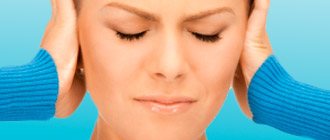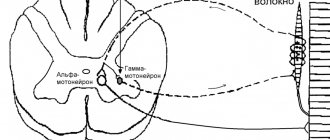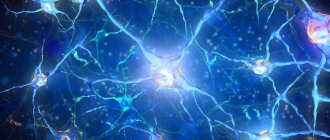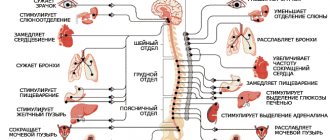Main symptoms:
- Apathy
- Insomnia
- Chest pain
- Headache
- Depression
- Fluctuations in blood pressure
- Impaired movement coordination
- Memory impairment
- Speech Impairment
- Numbness of the limbs
- Lack of erection
- Reduced temperature
- Irritability
- Vomit
- Weakness
- Difficulty in orientation
- Decreased libido
- Nausea
- Cardiopalmus
- Cold extremities
Nervous exhaustion is a psycho-emotional state that occurs in a person after suffering mental stress, stress and excessive mental activity. Our body is a well-functioning system in which everything is interconnected, and therefore overload of one of the systems (intellectual or emotional) immediately affects a person’s overall well-being, causing symptoms of nervous exhaustion.
Online consultation on the disease “Nervous exhaustion”.
Ask a question to the specialists for free: Neurologist.
- Causes
- Symptoms
- Treatment
Causes of nervous exhaustion
Every person has a reserve of internal strength that helps to cope with daily problems and stress. If a person does not take everything to heart, rests and eats well, then the resources spent during the day are quickly restored during night sleep.
But no one is immune from misfortunes. Prolonged strong nervous or physiological stress, coupled with insomnia, can quickly use up a person’s entire reserve of strength, leading to exhaustion. And if strength is not restored, then general exhaustion of the body will occur.
Thus, the causes of nervous exhaustion can be:
- overwork due to prolonged work;
- severe physiological stress, such as childbirth;
- high level of responsibility;
- long experiences and stress;
- surgical operations;
- various diseases;
- emotional trauma;
- increased mental stress.
Since a person’s reserve of internal strength is individual, not every factor listed above can trigger excessive consumption of resources. In addition, people do not react in the same way, the recovery process is different for everyone and takes different times.
What is depression? A guide to what you should know about depression.
We all experience episodes of sadness or depression - it's a normal part of life.
However, constantly feeling sad, experiencing negative thoughts and lack of energy is not something normal. If someone constantly feels sad, empty and irritable, to the extent that it affects their daily activities, this may be a sign of illness. Depression is a mood disorder that affects 350 million people worldwide, according to WHO. Signs range from prolonged feelings of unhappiness and hopelessness to loss of interest in things you used to enjoy.
Symptoms of nervous exhaustion
Nervous exhaustion increases unnoticed and at first looks like ordinary fatigue. However, this condition gradually accumulates and subsequently, unnoticed by the patient, turns into a pathology, which should be treated by a qualified psychotherapy specialist.
A person can notice the first signs of problems with the body himself, simply by listening carefully to himself:
- constant fatigue;
- sleep disorders: the patient cannot fall asleep, despite being drowsy during the day;
- the appearance of an inexplicable feeling of anxiety, pessimism;
- the appearance of periodically palpable palpitations, blood pressure imbalance;
- increased sensitivity to external irritating factors (loud sounds, bright light, strong aroma, etc.);
- frequently recurring headaches;
- pain in the legs, arms, back (of unknown origin);
- unreasonable increase in temperature;
- uncomfortable condition in the stomach or intestines;
- non-seasonal exacerbation of chronic diseases (tonsillitis, gastritis, sinusitis, etc.).
Symptoms also appear, which are often noticed by the patient’s relatives and friends:
- the person becomes irritable, he may be irritated both by the environment or the behavior of loved ones, and by himself;
- a person becomes impatient, he begins to get nervous already in the first minutes of forced waiting;
- increased sensitivity to foreign aromas, sounds, flashes of light appears;
- sleep becomes sensitive and anxious, a person often wakes up from nightmares, groans in his sleep, and in the morning does not feel a surge of vigor and energy;
- even with light exertion, headache and weakness are noted;
- a person’s character changes – uncertainty appears, self-esteem falls;
- disturbances occur in the sexual sphere (decreased libido, erectile dysfunction, impotence, etc.);
- the patient takes on a lot, but cannot complete anything, becomes inattentive, absent-minded, memory and concentration deteriorate;
- Weight fluctuations may be observed, appetite disappears or increases, and a bad mood is constantly present.
The clinical picture can be divided into three stages:
- Hypersthenic stage: the patient experiences irritability and fussiness. He himself understands that something is happening to him, but he cannot cope with it on his own. Often does not control his actions and emotions, provokes quarrels and conflicts. Headache and muscle pain, lack of sleep, insomnia, lethargy and decreased ability to work appear;
- Stage of irritating weakness: the patient becomes hot-tempered, but quickly subsides. His thoughts are pessimistic and anxious. In addition to headaches, heart pain, digestive disorders, allergic reactions, shortness of breath, dizziness are added;
- Hyposthenic stage: the patient enters a state of apathy, he is not interested in anything, the mood is indifferent and depressed, close to depression.
The effect of nervous exhaustion on the body
- Immunity. Weakening of the body leads to frequent illnesses; a person is literally open to any viruses;
- Nervous system. Stress, lack of sleep and psycho-emotional overload provoke the release of large amounts of “stress hormones”, which are very harmful in large quantities;
- Heart. Cortisol and other stress hormones have a negative impact on the cardiovascular system. A person complains of heart pain, arrhythmia, severe pressure changes;
- Digestive system. Against the background of nervous exhaustion, cases of stomach ulcers and gastritis are not uncommon. Indigestion, weight gain or loss are the consequences of a lack of proper rest.
These were only the physical consequences of exhaustion of the nervous system. In addition, social connections and a person’s quality of life suffer. Fatigue prevents you from working normally and taking care of your family, communicating with loved ones and friends does not bring joy, and a person begins to take out all his irritation on his family. Exhaustion of the nervous system is close to borderline mental states, which without proper treatment leads to the development of mental illness.
Dangers of pathology
Diagnosis of the disease is difficult due to the similarity of symptoms with other disorders, for example, vegetative-vascular dystonia.
Nervous exhaustion can cause depression if the condition is not treated. Nervous exhaustion in some cases is accompanied by panic attacks, which also negatively affects the patient’s health.
Over time, it is possible to develop a phobia or. Without timely treatment, nervous exhaustion can lead to the development of various neuropsychiatric diseases.
With nervous exhaustion, symptoms and treatment largely depend on the characteristics of the patient’s body.
Treatment of nervous exhaustion
The first thing to do at the beginning of therapy is to remove the irritating factor. Without this, treatment of nervous exhaustion will be extremely difficult and ineffective. Next, you must adhere to the following rules:
- It is necessary to properly organize work and rest time. Since almost every person works to provide for his own life, skillfully organized recreation becomes an important part of life. It is worth avoiding cases that will require unnecessary expenditure of internal resources without the right to long rest. Of course, hard work will help in building a career, but this same work can play a cruel joke on a person;
- Healthy and sound sleep. Nothing restores a person's strength like sleep. Night rest should be taken very seriously, because constant lack of sleep leads to the accumulation of fatigue;
- Sports and proper nutrition. Physical activity perfectly relieves stress and saturates the human body with pleasant sensations from active movement. Sport is not only an effective treatment for nervous exhaustion, but also its prevention. But sport is nothing without a healthy and regular diet, which will include only natural products;
- Enthusiasm. Writing, drawing, research, watching movies, reading books, dancing - any hobby should help in the treatment of nervous exhaustion, as it perfectly relieves its symptoms. In addition, the preventive effect will not take long to appear.
Nervous exhaustion, not aggravated by depression, can be cured without much difficulty using the above tips.
Treating nervous exhaustion with medications
A neurologist is the only non-psychiatric specialist who can determine nervous exhaustion. But the neurologist is not able to help solve the patient’s mental problems, so the reasons that led to this state will not be eliminated. Very often, with nervous exhaustion, vegetative-vascular dystonia is diagnosed. Experts prescribe the following medications for nervous exhaustion:
- Vasodilators help relieve various pains, relieve vascular spasms, and eliminate oxygen starvation in brain cells: betaserc, ginkgo biloba, mexidol, tanakan, etc.;
- Nootropic substances that support brain cells in a normal state are prescribed with caution, because they can increase irritability - these are alzepil, tenoten, pantogram, ceraxon, etc.;
- B vitamins - riboflavin, thiamine, thiacin - have a beneficial effect on the human nervous system.
Drugs for nervous exhaustion have a very good effect on the body, containing sedatives that can remove the feeling of tension, anxiety, make sleep normal, and improve the quality of rest.
Lifestyle change
If the problem is detected in time, you can do without drug treatment. To do this, you will need to reconsider your own lifestyle.
- A balanced diet is the key to good health and normal functioning of all body systems. You should avoid snacking on the go. It is necessary to eat often, but in small portions. The basis of the diet is fruits and vegetables, dairy products, meat and fish, and cereals.
- Rejection of bad habits. Smoking and alcohol abuse deplete the entire body. If you want to be healthy, you should forget about bad habits.
- The body needs a routine; this is the only way it can accumulate strength in a timely manner to combat stress and tension. It is necessary to go to bed and wake up at the same time every day. Sleep should be at least eight hours. Normalizing your work schedule is an important condition for recovery. The working day should be no more than nine hours with an hour break for lunch. Night shifts and overtime should be postponed until the body's resources are fully restored.
- It is necessary to devote at least two hours of time to walks in the fresh air every day. If you have problems sleeping, it is recommended to move your walks to the evening. This will help get rid of insomnia.
- Physical activity should be regular, but without overexertion. It is better to give preference to yoga, Pilates or swimming.
Having noticed symptoms of exhaustion, you should devote less time to work and affairs, and allocate the necessary time for your own health. The patient needs new pleasant impressions, calmness and regularity. If this cannot be achieved within a normal work schedule, it is recommended to take a vacation and spend it at a sanatorium-resort treatment.
Traditional methods of treating nervous exhaustion
Herbal teas, tinctures and infusions of medicinal plants
1) rosehip infusion, due to its high content of carotene and vitamin C, will effectively boost the immune system, and the remaining active components, in particular B vitamins, will have a beneficial effect on the nervous system. For 250 ml of boiling water, take a tablespoon of crushed rose hips, steam for at least 12 hours in a thermos, take as a bite with acacia, St. John's wort or buckwheat honey (a tablespoon) 3-4 times a day for a month;
2) chamomile infusion, thanks to essential oils and a unique combination of biologically active phytonutrients, perfectly tones and calms the nerves. An infusion of chamomile with honey helps with insomnia. Take a teaspoon of dried inflorescences per glass of boiling water and infuse under the lid for about 15-25 minutes. Take as tea, warm, three times a day;
3) a decoction of calamus rhizome is prescribed as a tonic for depression of the central nervous system. Pour 3 teaspoons of crushed root into 400 ml of boiling water and simmer under the lid over low heat for about a quarter of an hour, after straining, take 100 ml three times a day half an hour before meals;
4) extract (tincture) of radiola rosea is prescribed as an effective remedy for stimulating the central nervous system, as well as for neurasthenic conditions, weakness, fatigue and decreased performance. Pour 50 grams of crushed dried rhizomes into a dark glass container with 0.5 liters of vodka or medicinal spirit diluted 1:1, seal tightly and leave in a dark, cool place for about 15 days. Take 25 drops 3 times a day, half an hour before meals, with water. For asthenia, the last dose should not be less than 4 hours before bedtime. For patients suffering from hypertension, start taking 5 drops three times a day, gradually increasing the dose to 10 drops (constant blood pressure monitoring).
Consequences of nervous exhaustion
- Problems with society, a person’s character deteriorates, the emotional assessment of what is happening and the perception of the world around him changes. People become angry, irritated, and communication problems arise. A person withdraws into himself and becomes a recluse;
- Loss of identity. The attitude towards life in general changes irreversibly, and mental illness may begin. Manic states and obsessive desires and ideas appear. A person’s personality degrades to the point of neglect of personal hygiene.
In order to prevent the occurrence of mental problems, it is necessary to eliminate the cause itself, in this case, to put the nervous system in order. Nervous exhaustion, which is best treated with the help of experienced doctors, may improve if you take our advice.











